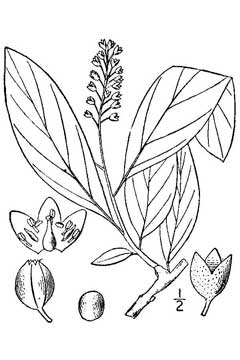 |
|
USDA-NRCS PLANTS Database / Britton, N.L., and A. Brown. 1913. An illustrated flora of the northern United States, Canada and the British Possessions. 3 vols. Charles Scribner's Sons, New York. Vol. 1 |
 |
|
Translate this page:
Summary
Physical Characteristics

 Pyrularia pubera is a deciduous Shrub growing to 3.5 m (11ft 6in).
Pyrularia pubera is a deciduous Shrub growing to 3.5 m (11ft 6in).
See above for USDA hardiness. It is hardy to UK zone 4. It is in flower from May to June. The species is dioecious (individual flowers are either male or female, but only one sex is to be found on any one plant so both male and female plants must be grown if seed is required). . The plant is not self-fertile.
Suitable for: light (sandy), medium (loamy) and heavy (clay) soils and prefers well-drained soil. Suitable pH: mildly acid and neutral soils. It can grow in semi-shade (light woodland). It prefers moist soil.
UK Hardiness Map
US Hardiness Map
Synonyms
Plant Habitats
Woodland Garden Dappled Shade; Shady Edge;
Edible Uses
Edible Parts: Fruit Oil
Edible Uses: Oil
Fruit[2, 46, 61]. Caution is advised since the fruit is said to be permeated with an acrid oil[1, 43]. The pear-shaped fruit is about 25mm long[200]. An edible oil is obtained from the seed[105]. Is this different from the acrid poisonous oil of the fruit?[K]
References More on Edible Uses
Medicinal Uses
Plants For A Future can not take any responsibility for any adverse effects from the use of plants. Always seek advice from a professional before using a plant medicinally.
Emetic Salve
The plant has been used as a salve on old sores[257]. The seed has been chewed to cause vomiting in the treatment of colic[257].
References More on Medicinal Uses
The Bookshop: Edible Plant Books
Our Latest books on Perennial Plants For Food Forests and Permaculture Gardens in paperback or digital formats.

Edible Tropical Plants
Food Forest Plants for Hotter Conditions: 250+ Plants For Tropical Food Forests & Permaculture Gardens.
More

Edible Temperate Plants
Plants for Your Food Forest: 500 Plants for Temperate Food Forests & Permaculture Gardens.
More

More Books
PFAF have eight books available in paperback and digital formats. Browse the shop for more information.
Shop Now
Other Uses
Oil
None known
Special Uses
References More on Other Uses
Cultivation details
Parasitic on the roots of a range of trees and shrubs, but most commonly Tsuga carolina, this plant needs to grow close to a host tree. It requires a well-drained but moisture retentive lime-free soil[200].
References Carbon Farming Information and Carbon Sequestration Information
Temperature Converter
Type a value in the Celsius field to convert the value to Fahrenheit:
Fahrenheit:
The PFAF Bookshop
Plants For A Future have a number of books available in paperback and digital form. Book titles include Edible Plants, Edible Perennials, Edible Trees,Edible Shrubs, Woodland Gardening, and Temperate Food Forest Plants. Our new book is Food Forest Plants For Hotter Conditions (Tropical and Sub-Tropical).
Shop Now
Plant Propagation
Seed - best sown in a cold frame as soon as it is ripe into a pot containing a small host tree. Stored seed will require 3 months cold stratification before it is sown[200]. Grow on in a cold frame until the plant is large enough to plant out and then plant it close to a mature host tree. Remove the small host tree once the plant is well established[200].
Other Names
If available other names are mentioned here
Native Range
NORTHERN AMERICA: United States (New York, Pennsylvania, West Virginia, Georgia, Kentucky, Tennessee, Virginia)
Weed Potential
Right plant wrong place. We are currently updating this section.
Please note that a plant may be invasive in one area but may not in your area so it's worth checking.
Conservation Status
IUCN Red List of Threatened Plants Status :

Growth: S = slow M = medium F = fast. Soil: L = light (sandy) M = medium H = heavy (clay). pH: A = acid N = neutral B = basic (alkaline). Shade: F = full shade S = semi-shade N = no shade. Moisture: D = dry M = Moist We = wet Wa = water.
Now available:
Food Forest Plants for Mediterranean Conditions
350+ Perennial Plants For Mediterranean and Drier Food Forests and Permaculture Gardens.
[Paperback and eBook]
This is the third in Plants For A Future's series of plant guides for food forests tailored to
specific climate zones. Following volumes on temperate and tropical ecosystems, this book focuses
on species suited to Mediterranean conditions—regions with hot, dry summers and cool, wet winters,
often facing the added challenge of climate change.
Read More
Expert comment
Author
Michx.
Botanical References
43200
Links / References
For a list of references used on this page please go here
Readers comment
© 2010, Plants For A Future. Plants For A Future is a charitable company limited by guarantee, registered in England and Wales. Charity No. 1057719, Company No. 3204567.